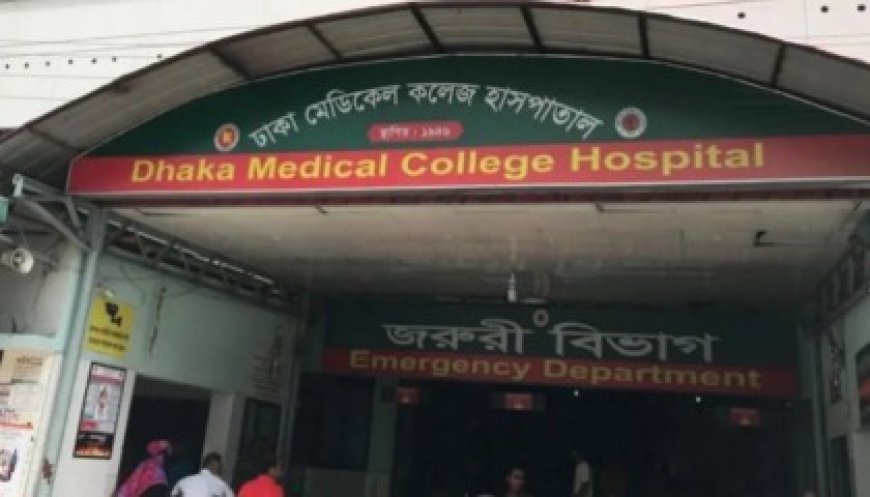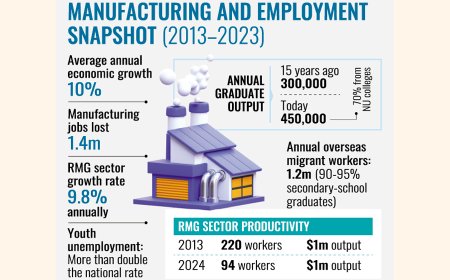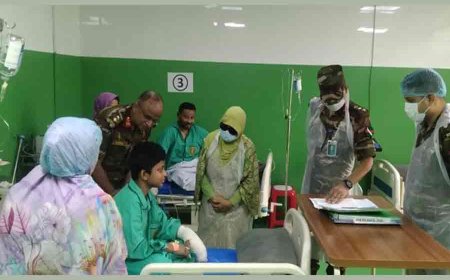Dhaka Medical College Hospital struggles with mismanagement and severe overcrowding
The scale of the crisis is evident as numerous patients lie on the floors of overcrowded corridors and wards

Crisis at Dhaka Medical College Hospital: Mismanagement and Overcrowding Threaten Patient Care
Dhaka Medical College Hospital (DMCH), one of Bangladesh’s largest public hospitals, faces a severe crisis as mismanagement and extreme overcrowding undermine patient care.
With nearly twice the patient load it was designed to handle, the hospital is struggling to deliver adequate services, exposing critical issues that impact patients and their families. Visitors entering DMCH encounter unsanitary conditions, inadequate food supplies, and an understaffed facility.
Patients are often seen lying on the floors of overcrowded corridors and wards, a clear indication of the crisis. Brigadier General Asaduzzaman Khan, the hospital’s director, acknowledged the mounting complaints and promised efforts to address these persistent issues.
Patients Suffer Delays and Supply Shortages
Alal Uddin, who sustained a head injury in an accident in Mymensingh, has been waiting in a corridor since October 4, unable to secure a bed. His brother, Jalal Uddin, expressed frustration, noting, “Nurses are not available when needed, and doctors are difficult to reach.”
Similarly, Jahid Hasan, a 24-year-old admitted on October 2, faced comparable struggles. His father, a CNG driver from Khilgaon, reported that a prescribed injection was not administered due to it being out of stock, despite its listing in the hospital pharmacy. Many families are forced to buy medicines from external sources due to shortages at the hospital.
Poor Hygiene Sparks Health Concerns
The hospital’s staff struggle to maintain hygiene standards amid the overcrowding. Director Khan pointed to patient misuse of facilities as a factor, stating, “Toilets are often misused, with items clogging the drains. With each toilet shared by around ten people, sanitation becomes very challenging.”
A visit to the hospital’s kitchen uncovered additional concerns, with waste accumulating near cooking areas and rice left uncovered, raising questions about food safety.
Staff Shortages and Financial Limitations
A shortage of Class Four staff exacerbates the hospital’s struggles. “Without more personnel, mismanagement will persist,” the director stated. He also pointed out that the daily food budget of Tk 150 per patient is inadequate and advocated for an increase to Tk 200 to improve meal quality.
Corruption Worsens the Crisis
Patients and families reported that they are often asked to pay Tk 50-100 as tips for basic services like wheelchair assistance. A hospital aide, speaking anonymously, shared, “Any small tip from patients helps us manage our expenses.” The director acknowledged this issue, stating that while some employees have been dismissed for such practices, fully eradicating it remains challenging.
Reforming Bangladesh’s Healthcare System
Experts emphasize the need for reforms to improve healthcare in Bangladesh, including stricter regulations for private clinics, decentralized recruitment of healthcare professionals, and a balanced doctor-patient ratio. Other obstacles include unregulated pharmacies, reactive health-seeking behavior, and high out-of-pocket expenses for patients.
A Strained Legacy
Established in 1946, Dhaka Medical College has expanded over the decades, including a new complex inaugurated in 2013, yet demand continues to exceed capacity. Despite having 39 public and 68 private medical colleges nationwide, Bangladesh still faces challenges in meeting its population’s healthcare needs.
Experts emphasize that at the core of hospital management is the commitment to quality patient care, encompassing not only medical treatment but also ensuring patient safety, dignity, and satisfaction. Continuous monitoring and improvement of care processes are essential for meeting the highest standards.
What's Your Reaction?



















































































